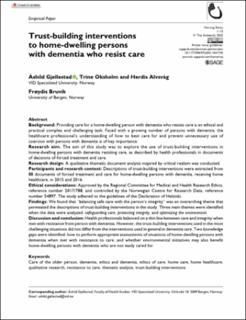| dc.description.abstract | Background:
Providing care for a home-dwelling person with dementia who resists care is an ethical and practical complex and challenging task. Faced with a growing number of persons with dementia, the healthcare professional’s understanding of how to best care for and prevent unnecessary use of coercion with persons with dementia is of key importance.
Research aim:
The aim of this study was to explore the use of trust-building interventions in home-dwelling persons with dementia resisting care, as described by health professionals in documents of decisions of forced treatment and care.
Research design:
A qualitative thematic document analysis inspired by critical realism was conducted.
Participants and research context:
Descriptions of trust-building interventions were extracted from 88 documents of forced treatment and care for home-dwelling persons with dementia, receiving home healthcare, in 2015 and 2016.
Ethical considerations:
Approved by the Regional Committee for Medical and Health Research Ethics, reference number 2017/788, and controlled by the Norwegian Centre for Research Data, reference number 54897. The study adhered to the guidelines of the Declaration of Helsinki.
Findings:
We found that “balancing safe care with the person’s integrity” was an overarching theme that permeated the descriptions of trust-building interventions in the study. Three main themes were identified when the data were analyzed: safeguarding care, protecting integrity, and optimizing the environment.
Discussion and conclusion:
Health professionals balanced on a thin line between care and integrity when met with resistance from person with dementia. However, the trust-building interventions used in the most challenging situations did not differ from the interventions used in general in dementia care. Two knowledge gaps were identified: how to perform appropriate assessments of situations of home-dwelling persons with dementia when met with resistance to care, and whether environmental initiatives may also benefit home-dwelling persons with dementia who are not easily cared for. | en_US |

